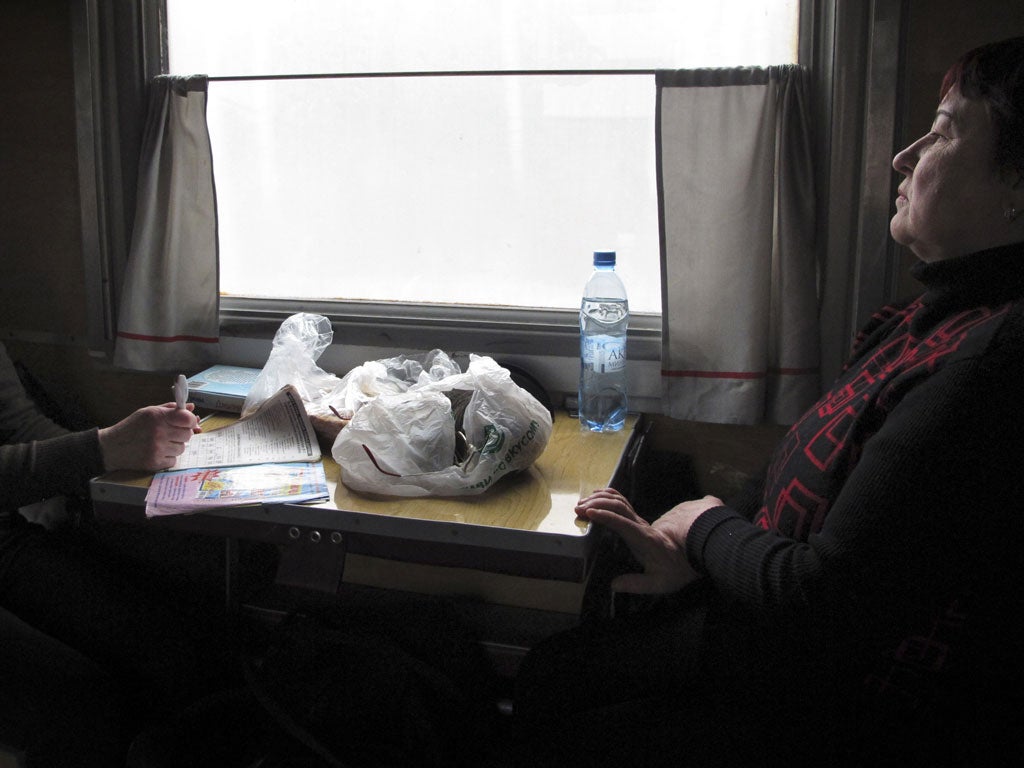Train 109 reveals a Russia resigned to Putin's return
Passengers voice their dissatisfaction before today's presidential elections

From the comfy cabins of first class to the crowded, smelly third-class bunks, passengers travelling to Moscow from a remote Arctic boomtown show why Vladimir Putin's almost certain return to the presidency in today's election feels less than triumphant.
The broad discontent seen on the long-distance train journey reflects that of this sprawling country. Although anger with Mr Putin isn't unanimous, it is clearly widespread, a striking challenge to his self-promoted image as the working man's hero who is the only leader all Russians can love and admire. Few doubt that Mr Putin, President from 2000-08, will win today, returning him to the Kremlin after four years as Prime Minister. But the frustrations voiced on Train 109 indicate his new term won't be easy.
The train's 66-hour, 2,170-mile trip to the capital starts in Novy Urengoi, a gas-producing town just below the Arctic Circle. Natural gas revenues are a key piece of the prosperity that Russia has enjoyed under Mr Putin. The newfound wealth initially pleased the working classes and lulled them into docile complacency, but many are increasingly unhappy with the political ossification that set in under Mr Putin and Dmitry Medvedev, his placeholder successor as President.
"For eight years we had Putin, then we had Medvedev, and now Putin again. Who after that: Medvedev?" asks Alexander Yurov in a third-class car where barracks-like bunks crowd both sides of a narrow walkway. "Well, this is what they're getting from me," he says, holding up his middle finger.
A group gathered around a little table between the bunks chuckle approvingly. An astonishing wave of protests against parliamentary elections in December that were marred by fraud sprang mainly from cities such as Moscow and St Petersburg. Mr Putin has been quick to characterise his opponents as coddled urban elites. But conversations with people like Yurov, a Novy Urengoi construction foreman who plans to vote for the Communist candidate, Gennady Zyuganov, reveal the dissatisfaction across all layers of society and across Russia's varied geography.
Much of Mr Putin's appeal has been based on the stability he brought after the chaos of the Soviet Union's collapse and Boris Yeltsin's capricious and tragicomic rule of the newly independent country. Statistics do present an impressive picture of improvements under Mr Putin, who is running against four Kremlin-approved opponents. When he was inaugurated for his first term in May 2000, the average monthly wage was £47; it's 10 times higher now. The infamously low life expectancy for males rose from 60 to 64. Although Russia's murder rate is still high by European standards, it has fallen nearly 45 per cent in the past dozen years.
But many of those in the neat, two-berth cabins of first class are fed up with the unbridled corruption that infiltrates their everyday lives. Igor, a software entrepreneur, points to his smartphone and grumbles: "I often buy these as presents." He means, of course, as bribes to government officials. He says failure to curry favour with officials could leave him prone to arbitrary government checks and ruin his chances in state tenders.
The train stop at Gus-Khrustalny, some two hours east of Moscow, demonstrates that, although Russia has come far under Mr Putin, it is still a country of marginal living for many. Women employed at the city's glassware factory clamber aboard, prowling the corridors to sell stemware and trinkets they make in their spare time to supplement their wages.
Mr Putin's unchallenged rule has hinged greatly on a deep-rooted conformism among Russians, who widely concluded that an excess of democracy in the 1990s led to chaos and a deterioration in their standard of living. In big cities, a small minority of internet-savvy dissenters bucked this trend, rejecting the official narrative that political pluralism and free media must be sacrificed for stability and prosperity. Criticism of Mr Putin has been all but banished from the national airwaves – allowing the Kremlin to dismiss dissent as irrelevant sniping by marginal figures.
A medicinal supplies trader in second class, Yury Pulin, says it's fear that has stopped people from being critical of Mr Putin's rule. "If you say anything against the government, they'll quickly shut you down. Critics have latched on to such lack of freedom of expression, as well as other abuses.
Yet despite all the criticism, the passengers on Train 109 agree, with a degree of resignation, that their next President will be Mr Putin.
Subscribe to Independent Premium to bookmark this article
Want to bookmark your favourite articles and stories to read or reference later? Start your Independent Premium subscription today.

Join our commenting forum
Join thought-provoking conversations, follow other Independent readers and see their replies